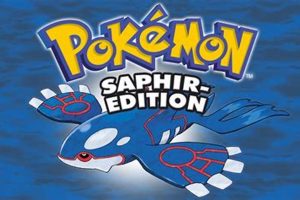A file, typically in a compressed format, containing the data from a read-only memory chip that originally resided within a physical game cartridge for a specific handheld gaming console. These files allow individuals to play versions of particular games on emulators designed for computers or other devices.
Digitizing the data from these game cartridges offers a method to preserve titles from previous generations of consoles, ensuring their accessibility even as original hardware becomes scarce or fails. Furthermore, it allows enthusiasts to experience these games on modern platforms, often with enhanced features such as increased resolution or save states. The practice has a complex history intertwined with copyright law and intellectual property rights.
The subsequent sections will delve into the availability, ethical considerations, and potential legal ramifications associated with obtaining and utilizing these files, exploring the debate surrounding their impact on the video game industry.
The following guidelines offer informative counsel regarding interaction with digital game files and related software, emphasizing responsible engagement within relevant legal and ethical frameworks.
Tip 1: Verify Source Integrity: Prior to obtaining a game data file, rigorously examine the source. Reputable online communities and established archival sites typically possess safeguards against malicious software. Prioritize sources with community reviews and demonstrable history of safe file provision.
Tip 2: Employ Antivirus Protocols: Implementing updated antivirus software is crucial. Scan all downloaded files before execution to mitigate potential threats. Maintain vigilance, as malware can be disguised within these files.
Tip 3: Understand Legal Frameworks: Acquaintance with applicable copyright laws is paramount. Unauthorized duplication or distribution of copyrighted material constitutes infringement. Research the legal status of the specific game in question within the applicable jurisdiction.
Tip 4: Explore Open-Source Alternatives: In situations where access to a specific game is desired, investigate open-source reimplementations or fan-made remakes. These may offer similar gameplay experiences without raising copyright concerns.
Tip 5: Respect Intellectual Property: Acknowledge the creators of the original game. Support the game development industry by purchasing legitimate copies of games when available. Consider subscribing to online services offering access to older titles.
Tip 6: Practice Safe Emulation: Exercise caution when configuring emulator settings. Incorrect settings can lead to system instability or performance degradation. Consult online resources and emulator documentation for optimal configuration parameters.
Adherence to these guidelines promotes a responsible approach to the utilization of game data files, aligning personal enjoyment with respect for copyright and intellectual property rights. Prudent behavior minimizes risk and supports a sustainable future for the gaming industry.
The concluding section will summarize the critical aspects of this discourse, reiterating the importance of ethical conduct and legal compliance within the realm of digital gaming content.
1. File Source
The origin from which a game data file is acquired profoundly influences its integrity and legitimacy. In the context of a game file, the source dictates not only the file’s operational status but also its legal and ethical standing.
- Reputable Archival Sites
Dedicated archival sites, often community-driven, prioritize preservation and accuracy. These platforms typically vet uploaded files, reducing the risk of corruption or malware. However, even on these sites, verifying file checksums against known good dumps remains critical.
- Peer-to-Peer Networks
Peer-to-peer (P2P) networks represent a high-risk source. The absence of centralized control facilitates the dissemination of modified or malicious files. Reliance on P2P networks necessitates heightened vigilance and rigorous pre-execution scanning.
- Online Forums and Communities
Game-specific forums and communities can offer a curated selection of files, often accompanied by user feedback regarding file quality and safety. Active participation in such communities allows for informed decision-making and access to valuable verification resources.
- Direct Downloads from Unverified Websites
Acquiring files directly from unverified websites poses significant risks. These sources often lack security measures and may actively distribute malware disguised as game files. This practice should be avoided to minimize the risk of system compromise.
The provenance of a game file dictates its trustworthiness. Prioritizing reputable sources, employing stringent verification protocols, and maintaining awareness of potential risks are essential practices for responsibly engaging with digital game preservation.
2. Emulator Compatibility
Emulator compatibility is a critical determinant of the usability of a digital game file. The ability of an emulator to accurately interpret and execute the code contained within the file directly impacts the user experience. In the specific context of a certain game file, this compatibility dictates whether the game can be played as intended or at all.
- Core Accuracy
Emulator core accuracy refers to the precision with which an emulator replicates the original hardware’s functions. Higher accuracy translates to fewer glitches, better performance, and a more authentic gaming experience. Incompatibility can manifest as graphical errors, sound distortions, or even complete game crashes.
- Format Support
Emulators are designed to support specific file formats. The game file format must be compatible with the emulator’s capabilities. An incorrect or unsupported format will prevent the emulator from recognizing and loading the game’s data, rendering it unplayable.
- Hardware Requirements
Emulators often have specific hardware requirements, including processor speed, memory capacity, and graphics processing capabilities. A system that does not meet these requirements may experience performance issues, such as lag or slow frame rates, affecting the playability of the game. For instance, demanding titles may necessitate more powerful hardware for smooth emulation.
- Software Dependencies
Beyond the emulator itself, the operating system and installed software libraries can also impact compatibility. Missing or outdated dependencies may prevent the emulator from functioning correctly, regardless of the file’s integrity. Ensuring that the system meets all software prerequisites is crucial for successful emulation.
Successful emulation of a specific game file hinges on a confluence of factors, from core accuracy to hardware and software compatibility. Addressing each of these elements is essential for achieving a positive and authentic gaming experience.
3. Game Legality
The legality surrounding digital game files is complex and directly relevant to the circulation and usage of files pertaining to specific titles. The unauthorized duplication and distribution of copyrighted video game content constitutes infringement, a violation of intellectual property laws. Consequently, the possession and use of a file are contingent upon the legal framework governing copyright and fair use.
The implications of copyright infringement extend beyond individual users. Entities involved in the distribution of unauthorized game files may face legal action from copyright holders, potentially resulting in significant financial penalties and reputational damage. Furthermore, the proliferation of illegal files can undermine the economic viability of game developers and publishers, impacting their ability to create new content. Conversely, the preservation of games, especially older or unavailable titles, can be a legitimate objective if undertaken within legal boundaries, such as obtaining explicit permission from copyright holders or adhering to established fair use doctrines.
Understanding the legal landscape is essential for navigating the complex world of digital game files. Individuals and organizations must carefully consider the copyright status of a given game and the potential legal ramifications associated with its distribution and use. Adherence to copyright laws and respect for intellectual property rights are crucial for fostering a sustainable and ethical gaming ecosystem. The following segments will further examine the related topic of copyright issues, expanding on the intricacies involved in this area.
4. Copyright Issues
The dissemination and utilization of digital game files raises significant copyright concerns, particularly in the context of “pokemon ranger rom”, where the unauthorized reproduction and distribution of copyrighted game data often occur. Understanding the nuances of copyright law is crucial for navigating the legal complexities associated with these files.
- Reproduction Rights
Copyright law grants exclusive reproduction rights to the copyright holder, typically the game developer or publisher. Creating or distributing copies of “pokemon ranger rom” without explicit permission constitutes copyright infringement. This includes both direct downloads and file sharing through peer-to-peer networks.
- Distribution Rights
The copyright holder also possesses the exclusive right to distribute their work. Uploading “pokemon ranger rom” to websites or sharing it through any means without authorization violates distribution rights. This applies regardless of whether the file is offered for free or for sale.
- Derivative Works
Copyright protection extends to derivative works, which are based on or adapted from the original work. Modifying or creating ROM hacks of “pokemon ranger rom” without permission can also infringe on copyright, as these modifications are considered derivative works.
- Fair Use Limitations
While copyright law grants broad protections, it also includes limitations such as fair use. Fair use allows for certain uses of copyrighted material without permission, such as for criticism, commentary, or educational purposes. However, fair use is a complex legal doctrine, and whether a particular use of “pokemon ranger rom” qualifies as fair use depends on a fact-specific analysis considering factors like the purpose and character of the use, the nature of the copyrighted work, the amount and substantiality of the portion used, and the effect of the use on the market for the copyrighted work. Using the file for personal archival purposes may or may not fall under fair use depending on the jurisdiction and specific circumstances.
These factors collectively highlight the legal risks associated with acquiring, distributing, or modifying a certain game file. Individuals engaging with these files should be aware of their rights and obligations under copyright law to avoid potential legal consequences. Careful consideration of these issues is paramount to ensure compliance and respect for intellectual property rights.
5. Preservation Efforts
The digital archiving of software, including the specific game under discussion, represents a critical facet of cultural heritage preservation. As physical media degrades and original hardware becomes scarce, digitizing these titles ensures continued access for future generations. These endeavors are motivated by a desire to prevent the loss of historically significant games.
- Digital Archiving
The systematic process of creating digital copies of game data files. This involves extracting the contents of the original game cartridge and storing them in a digital format suitable for long-term storage and emulation. The goal is to replicate the original gaming experience as accurately as possible on modern systems. Archiving efforts are often undertaken by dedicated communities and organizations focused on preserving video game history. This activity can be complicated by copyright restrictions and the need to obtain legitimate copies or licenses when possible.
- Emulator Development
The creation and refinement of software that emulates the hardware of older gaming consoles. Emulators are essential for playing digitized game files on modern computers and devices. Ongoing emulator development focuses on improving accuracy, performance, and compatibility with a wide range of game files. Many emulators are open-source projects, driven by volunteer developers dedicated to preserving gaming history. These are often complex software projects demanding extensive knowledge of the original console hardware and software architecture.
- Community Contributions
The collaborative efforts of individuals and groups to document, catalog, and preserve information related to video games. This includes creating comprehensive game databases, documenting game mechanics and strategies, and providing technical support for emulation. Community contributions are vital for ensuring the accuracy and accessibility of game preservation efforts. These are grassroot efforts, born from a deep appreciation and dedication to preserving gaming’s rich history.
- Legal and Ethical Considerations
Navigating the complex legal landscape surrounding copyright and intellectual property rights. Preservation efforts must balance the desire to preserve gaming history with the need to respect the rights of copyright holders. Obtaining permission from copyright holders is often challenging, particularly for older or abandoned titles. Discussions and debates about fair use, orphan works, and digital preservation are ongoing within the preservation community. Balancing preservation goals with legal and ethical requirements is a significant ongoing challenge.
These components of game preservation demonstrate the multifaceted nature of efforts to maintain access to classic games. While digitization and emulation provide the technical means for preservation, community involvement and legal considerations shape the ethical and practical aspects of ensuring these titles remain accessible for future generations. These ongoing endeavors underscore the importance of video games as a form of cultural expression and the commitment to safeguard them for posterity.
6. Data Integrity
In the context of a specific game file, data integrity refers to the assurance that the file has remained unaltered and uncorrupted since its original creation or extraction. This aspect is paramount to ensuring that the game functions as intended and delivers the authentic gaming experience.
- Verification of Checksums
Checksums, such as MD5 or SHA-1 hashes, serve as digital fingerprints for files. Comparing the checksum of a downloaded game data file against a known good checksum verifies that the file has not been modified during transmission or storage. Mismatched checksums indicate corruption or tampering, necessitating re-downloading from a trusted source. For example, if a specific game file’s verified MD5 checksum is absent from a downloaded file, the file should not be trusted.
- Detection of Corruption
Data corruption can manifest as errors during gameplay, such as graphical glitches, audio distortions, or unexpected crashes. These symptoms may indicate underlying issues with the game file’s integrity. Consistent errors suggest a corrupted file, requiring replacement with a known good copy. For example, a persistent graphical glitch in a cutscene could point to data corruption in that section of the file.
- Ensuring Compatibility
Data integrity directly impacts emulator compatibility. A corrupted game file may fail to load properly in an emulator, or it may exhibit unpredictable behavior. Verifying the integrity of the file is a crucial step in troubleshooting emulator-related issues. A seemingly incompatible file may function correctly once its data integrity has been confirmed.
- Preservation of Authenticity
Maintaining data integrity is essential for preserving the authenticity of the gaming experience. An uncorrupted file ensures that the game functions exactly as it was originally designed, free from unintended alterations or errors. This is particularly important for historical preservation efforts, where the goal is to accurately represent the original game. A compromised file diminishes the accuracy and historical value of the preserved title.
These considerations underscore the critical role of data integrity in ensuring the proper functioning and preservation of the title. By verifying checksums, detecting corruption, ensuring compatibility, and preserving authenticity, users can maximize their gaming experience and contribute to the long-term survival of these culturally significant titles.
7. User Experience
The user experience with a particular game file is inextricably linked to several factors, each exerting considerable influence on the overall perception and enjoyment of the game. These factors include ease of acquisition, successful emulation, gameplay fidelity, and the mitigation of potential technical issues. A positive user experience hinges on a seamless integration of these elements, while deficiencies in any one area can detract significantly from the overall enjoyment of the game. A reliable source for the game file, such as a vetted archival site, provides an initial level of confidence, setting the stage for a smoother user journey. The choice of emulator directly impacts compatibility and performance, determining whether the game functions as intended or is plagued by glitches and errors. Furthermore, the accuracy of the emulation in replicating the original gameplay mechanics and graphics contributes significantly to the perceived authenticity of the experience.
Negative user experiences often stem from corrupted files, emulator incompatibilities, or inaccurate emulation. A corrupted game file can lead to crashes, graphical anomalies, or gameplay errors, frustrating the user and rendering the game unplayable. Incompatibility between the game file and the emulator can result in similar issues, necessitating experimentation with different emulators or configurations. Even with a functional game file and a compatible emulator, inaccurate emulation can detract from the experience by introducing graphical or audio distortions, altered gameplay mechanics, or other deviations from the original game. For example, control mapping issues and poor resolution scaling can negatively affect a players engagement.
Ultimately, the user experience with game files like a certain title reflects the convergence of technical factors and individual preferences. While reliable sources, accurate emulation, and mitigation of technical issues contribute to a positive experience, individual perceptions of gameplay, graphics, and sound also play a significant role. Understanding the interplay of these factors is crucial for developers, preservationists, and enthusiasts alike, enabling them to optimize the user experience and ensure that these digital treasures remain accessible and enjoyable for generations to come. Challenges include the complexity of emulation, the variability of user hardware, and the ethical considerations surrounding accessing copyrighted content. These influence the potential experiences of end-users.
Frequently Asked Questions about the specific game file
The following section addresses common inquiries regarding the acquisition, usage, and legal status of a certain type of game file, offering concise and informative answers to assist users in navigating this complex topic.
Question 1: What precisely constitutes a ‘specific game file’?
The term refers to a digital file that contains the complete data set extracted from a physical game cartridge. This data is then utilized in conjunction with an emulator to recreate the original game experience on alternative hardware platforms.
Question 2: Where can the file for “pokemon ranger rom” be obtained?
These files are commonly found on various websites, online forums, and peer-to-peer networks. Caution is advised when sourcing such files, as their legitimacy and safety cannot be guaranteed across all platforms.
Question 3: Are files for “pokemon ranger rom” legal to download and play?
The legality of downloading and playing a game file is contingent upon copyright law. Possessing a copy of the game may be permissible if the individual owns the original physical cartridge. However, distributing or downloading the file without owning the original copy generally constitutes copyright infringement.
Question 4: What is an emulator, and how does it relate to a specific game file?
An emulator is a software program designed to mimic the hardware of a specific gaming console. It enables a computer or other device to run game files as if they were being played on the original console. The game file provides the game data, while the emulator provides the environment to execute that data.
Question 5: What risks are associated with downloading a specific game file from untrusted sources?
Downloading game files from untrusted sources carries significant risks, including the potential for malware infection, virus exposure, and the acquisition of corrupted or incomplete files. Such files may compromise system security and render the game unplayable.
Question 6: Are there ethical considerations involved in using files for “pokemon ranger rom”, even if they are technically legal?
Ethical considerations extend beyond legal compliance. Downloading and playing game files, even if legally permissible, can potentially undermine the economic viability of game developers and publishers. Supporting the original creators through legitimate purchases contributes to a sustainable gaming ecosystem.
In summary, while a certain game file offers a means to experience classic games on modern devices, the acquisition and usage of such files must be approached with caution, considering legal, ethical, and security implications.
The subsequent section will provide a final synthesis of the key topics discussed, reinforcing the importance of responsible engagement with digital game content.
Conclusion
This exploration of a specific game file has illuminated several critical facets, encompassing legal considerations, ethical responsibilities, and potential security risks. The availability of “pokemon ranger rom” facilitates access to classic gaming experiences; however, this accessibility necessitates a discerning approach, prioritizing legitimate sources and respecting intellectual property rights. The analysis has underscored the complexity inherent in digital preservation, balancing the desire to safeguard cultural artifacts with the imperative to uphold copyright regulations.
The future of gaming hinges on a delicate equilibrium between innovation, accessibility, and ethical conduct. The responsible utilization of files is not merely a matter of legal compliance but a testament to the commitment to a sustainable and equitable gaming ecosystem. As technology advances, users should remain cognizant of their obligations, ensuring that their actions contribute positively to the gaming community and the broader creative landscape. Respect for copyright fosters a culture of innovation, benefitting both creators and consumers. The preservation and enjoyment of gaming’s past should not come at the expense of its future.







